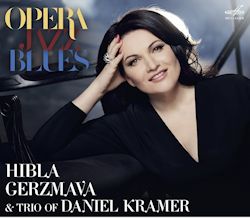 BUY NOW AmazonUK AmazonUS |
Hibla Gerzmava and the trio of Daniel Kramer Opera, Jazz, Blues: Jazz Arrangements by Daniel Kramer
|
anon: Hava Nagila
Donizetti: Me voglio fa'na casa
Dvorak: Songs My Mother Taught Me, Op. 55 No. 4
Gershwin: Summertime (from Porgy and Bess)
Glinka: I am here, Inezilla
Handel: Lascia ch'io pianga (from Rinaldo)
Howard, B: Fly Me to the Moon
Kalman: Ich sing mein Lied im Regen und Schnee (from Das Veilchen von Montmartre)
Mozart: Exsultate, jubilate, K165 - Alleluia
Mozart: Serenade No. 13 in G major, K525 'Eine kleine Nachtmusik': Allegro
Schubert: Ave Maria, D839
trad: About the Rock
Verdi: » strano! Ť strano!.Ah! fors Ť lui...Sempre libera (from La Traviata)
Chopin: Etude in E major
Hibla Gerzmava with Daniel Kramer (piano): Sergei Vassiliev (bass): Pavel Timofeyev (drums)
Recorded 2016
The classical soprano Hibla Gerzmava studied at the Moscow Conservatory and enjoys an international career, having sung at the Liceu in Barcelona, Covent Garden in London, the Ch‚telet in Paris and at numerous other prestigious venues. She has worked with conductors from Maazel to Pappano, Pletnev to Spivakov. A festival named after her takes place annually in her native Abkhazia.
Itís very easy to hit the crossover buffers. And itís especially tempting, even now, to jazz the classics, a popular pastime in the 1930s and 40s. In this case, for the most part, Gerzmava takes classical arias and joins with pianist Daniel Kramer and Ė sometimes Ė his trio for explorations of the nexus between classical and jazz. This, as might be suspected, has the makings of Ďneither fish nor fowlí about it. Violettaís aria from La Traviata, for instance, is subjected to a piano reduction which then introduces lighter harmonies. Glinkaís song is given a kind of Randy Newman blues backing with bass and drums. Schubertís Ave Maria is given a light shake-down with piano counter-themes and a long piano solo. The Alleluja from Mozartís Exsultate jubilate is played pretty straight with a bashful drum contribution but Eine Kleine Nachtmusic gets the git-on-down Gospel treatment from Kramer and the la-la-la vocals from Gerzmava.
Chord substitutions from Kramer announce Handelís evergreen Lascia ch'io pianga but thereís no improvisation from the soprano, here or elsewhere. Thereís a hint or two of Keith Jarrett in the pianistís work on the DvorŠk whereas the Chopin Etude is largely a vehicle for Kramer and later on his bass player who takes a discreet solo. When Gerzmava gets off the classical treadmill she makes very straight work of Fly Me To The Moon, one of the more hackneyed choices to be made, and over Vassilievís bass she makes contrived work of Summertime. The unlikely vehicle of Hava Negila goes reasonably but the traditional Abkhaz song, About the Rock, goes even better.
Gerzmava has no real jazz chops and no great feel for playing with rhythms: Kramerís arrangements are doubtless tailored for her limitations but he, too, sounds constrained by things. Itís not the happiest of marriages.
Jonathan Woolf